New Article: Democratization Through ‘Cancel Culture’ — Three Levels of Artistic Freedom

“Political correctness”, “identity politics” and “cancel culture” are nowadays predominantly used as weapons by conservatives to defend their privileges against emancipative new regulations. Criticizing such new regulations as restrictions on artistic freedom and freedom of expression is therefore mostly wrong. In fact, “political correctness,” “identity politics,” and “cancel culture” contribute to the inclusive realization of democracy.
These are the theses of my new English article in the volume Conflictual Cultural Politics Konfliktuelle Kulturpolitik, out now with transcript! I am honored to be part of the book, which features constributions by distinguished colleages and is edited by Anke Schad-Spindler Friederike Landau-Donnelly, Stefanie Fridrik, and Oliver Marchart.
In the article, I show that it depends on which level political regulation of art takes place: non-state in the general art world, para-state in public broadcasting or public art funding, or on the level of the state. Only when the state intervenes in ongoing debates with centralized legal, economic, and symbolic power it might constitute a case of problematic ‘cancel culture’ - but this hardly ever happens.
German versions
The article is an updated and revised translation of the German article Umkämpfte Kunstfreiheit — Ein Differenzierungsvorschlag which was published Zeitschrift für Menschenrechte in 2020. There are two shorter versions available in German, which appeared in the Verfassungsblog and the Sächsischen Zeitung.
Cite and download
Schubert, Karsten (2023): Democratization Through “Cancel Culture”—Three Levels of Artistic Freedom. In: Schad-Spindler, Anke; Landau-Donnelly, Friederike; Fridrik, Stefanie; Marchart, Oliver (ed.): Konfliktuelle Kulturpolitik, Politologische Aufklärung – konstruktivistische Perspektiven. Wiesbaden: Springer Fachmedien, 29–40. https://doi.org/10.1007/978-3-658-40513-7_2
Final Manuscript
Related Posts
- Contested Artistic Freedom - A Differentiation. New publication in the Journal of Human Rights, 3. February 2021
- Feuilleton Article: More Cancel Culture Please! (Sächsische Zeitung), 8. January 2021
- New publication: Democratization through 'Cancel Culture'. On the relationship between freedom of art and emancipation, 3. December 2020
- Special Issue: The Dissolution of the Liberal Consensus (ZfPT), 25. January 2024
- Video online: 'Cancel Culture. Identity politics as a threat to artistic freedom?' at the Kulturpolitische Gesellschaft, 18. May 2021
Cancel CulturePolitical CorrectnessRight-wing PopulismLawFreedom of ArtFreedom of Speech
255 Words
2023-04-21 08:02 +0200